Narrative Writing: How to Score Full Marks | English Language for GCSE/IGCSE - Class 10 PDF Download
| Table of contents |

|
| Introduction |

|
| How to structure your narrative writing |

|
| Narrative Writing Techniques |

|
| Steps to Success |

|
Introduction
In Section B, you're tasked with writing for a distinct purpose and in a specified format. Adhering to the conventions of this form is crucial, as achieving the highest mark necessitates adjusting your tone, style, and register to suit various forms, purposes, and audiences.
This means:
- The tone (the sound of the narrator’s “voice”) is appropriate and convincing
- The register (your vocabulary and phrasing) is suitable for the purpose
- The style of the writing (the sentence structure and the overall structure of your writing) is dynamic and engaging
When preparing your response, it's beneficial to consider the tone, style, and register, along with the conventions of the chosen form. Planning is essential for any extensive writing task, so allocate 10 minutes to brainstorm your ideas before commencing writing.
Here, we'll explore how to craft a compelling narrative piece in the subsequent sections:
- How to structure your narrative writing
- Narrative writing techniques
- Steps to success
How to structure your narrative writing
In order to adhere to the conventions of story writing, it is best to:
- Planning Your Writing:
- Plan your writing systematically to create a coherent storyline that captivates your audience.
- Organize one central event that drives the narrative forward.
- Ensure your plot is straightforward yet engaging, maintaining a logical flow.
- Utilize structural techniques like flashbacks to provide context and depth to your story.
- Employ past-tense verbs consistently for a cohesive narrative.
Developing Compelling Characters:
- Delve into essential character archetypes, such as the villain, victim, or hero, to add depth.
- Tailor your characters to fit these archetypal roles, enhancing the narrative dynamics.
- Focus on pertinent details when describing characters, like distinctive colors or body language.
- Utilize descriptive verbs in dialogues like "shrieked," "mumbled," or "whispered" for character depth.
- Repetition of color-related ideas can be impactful for emphasis.
- You can repeat ideas for emphasis.
Narrative writing compositions should be organized into five or six paragraphs. Thorough planning is essential, considering the limited time available to craft a cohesive plot. Responses lacking in planning may result in abrupt or unresolved endings, which could impact your scoring.
Various narrative structures or arcs are available to plan your story. Given the time constraint of 15 minutes, your narrative should be well-controlled and succinct.
One approach to achieve this is to adopt a five-part narrative structure, such as Freytag’s Pyramid: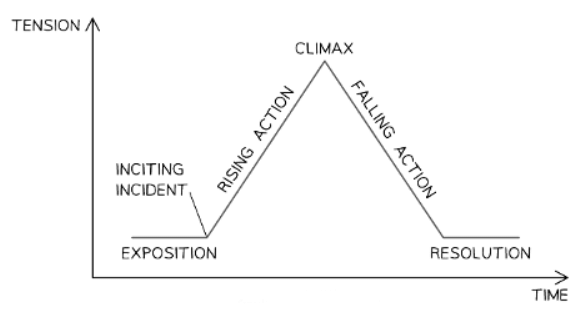
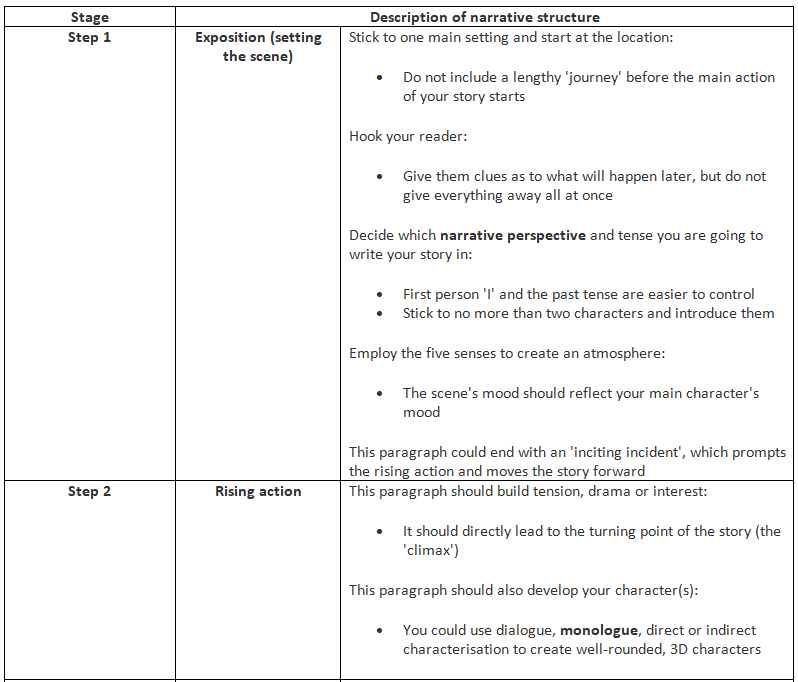
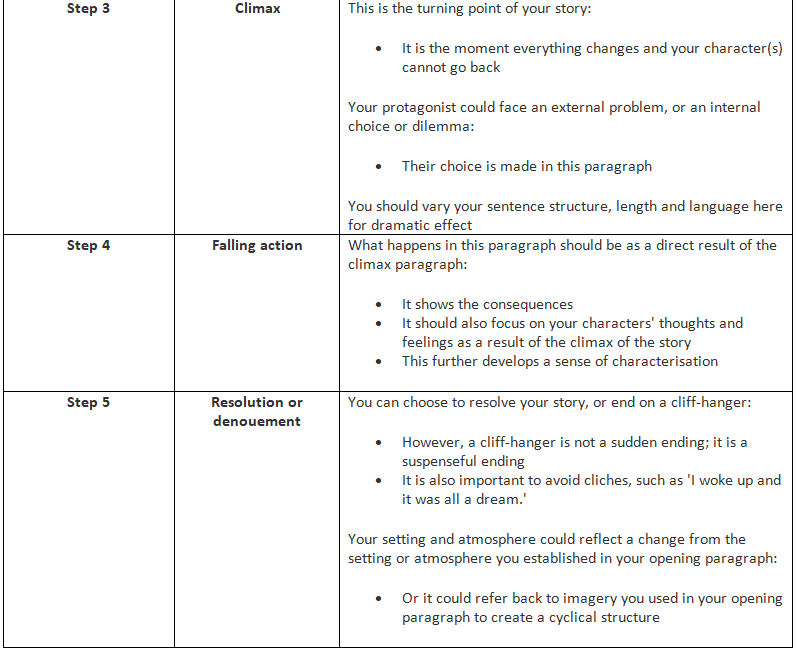 It's not necessary for each paragraph to have uniform length. Effective responses vary paragraph lengths to create impact. The key is to develop distinct ideas or points in each paragraph and refrain from repeating descriptions throughout your narrative.
It's not necessary for each paragraph to have uniform length. Effective responses vary paragraph lengths to create impact. The key is to develop distinct ideas or points in each paragraph and refrain from repeating descriptions throughout your narrative.
Narrative Writing Techniques
After outlining the structure of your narrative, it's beneficial to contemplate how to integrate methods and techniques into your writing. Here are some guidelines to assist you in incorporating setting, characterization, and other linguistic techniques to enhance the engagement of your narrative.
Setting
Since this task evaluates the capability to communicate clearly, effectively, and imaginatively, it's essential to contemplate how language can be employed constructively in a short story to evoke an atmosphere or mood. Establishing an impactful setting is crucial as it enhances the overall atmosphere and mood.
- Ensure your setting mirrors your main character's emotional state, a concept known as pathetic fallacy, where the environment reflects the character's mood, like "the lonely road."
- Let your setting evolve alongside the story's progression; contrasting scenes effectively convey ideas and engage readers. For instance, starting on a sunny afternoon but ending as the sun sets or a storm approaches should reflect the character's mood.
- Develop a clear setting before introducing other details like character introduction. Utilize sensory language to describe settings, encompassing sights, sounds, smells, and weather.
- Dedicate an entire paragraph to describe the scene without mingling other information, maintaining consistency in mood-building descriptive language.
- Avoid revealing too much at once to keep readers intrigued and questioning the unfolding narrative. Approach setting establishment akin to the game "Taboo," where descriptions hint at details without explicitly stating them.
Characterisation
In crafting your short story, detailed characterisation is essential. Characters should embody certain concepts, such as hope, strength, abandonment, or injustice. Limit yourself to two characters within the allotted time.
Characters should undergo development or change throughout the narrative to be well-rounded. The mark scheme favors responses that adeptly convey ideas, necessitating consideration of effective character-building techniques in a concise format. Emphasize indirect characterisation over direct characterisation for optimal impact.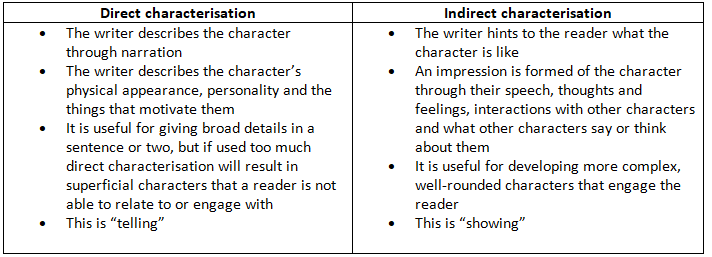
Here, we will consider how to plan your character(s) effectively to engage your reader. This is what the examiner is looking for in your answer: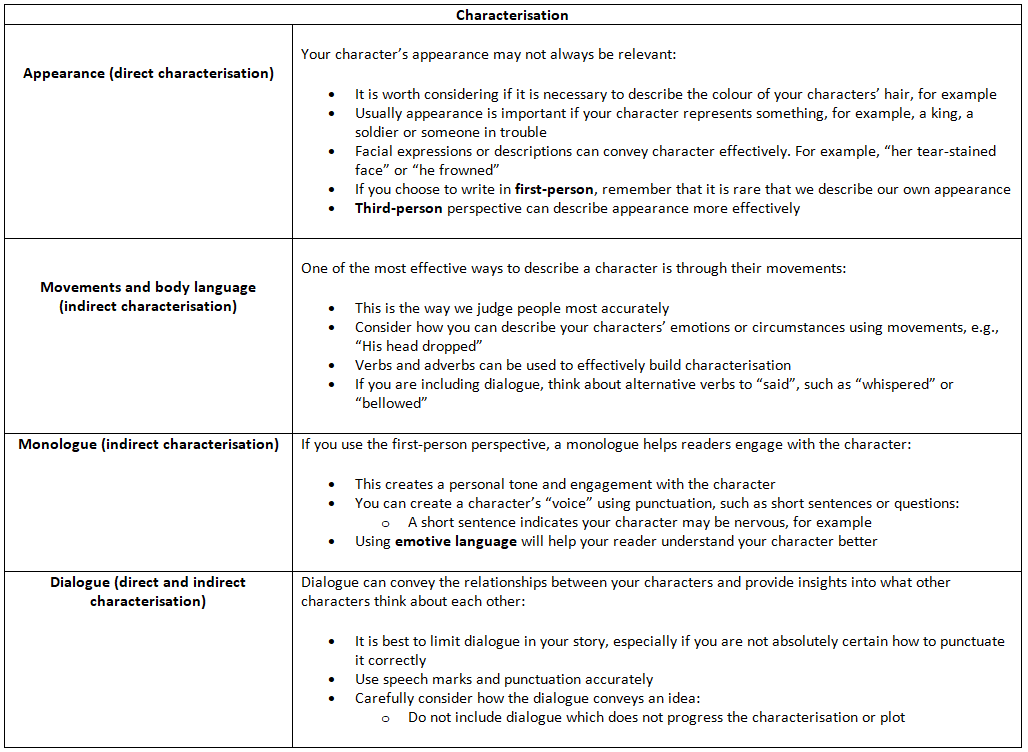
Linguistic devices
When selecting your language and techniques, be mindful that every choice serves a purpose. Consider the connotations of words and phrases, as they can enhance the depth of your writing. Your word choices should evoke specific emotions or reveal aspects of characters' personalities, backgrounds, or emotions. Employ the "show, not tell" principle to vividly immerse readers in your narrative.
Below you will find a brief explanation of some of the key techniques you could employ in your narrative (or descriptive) writing: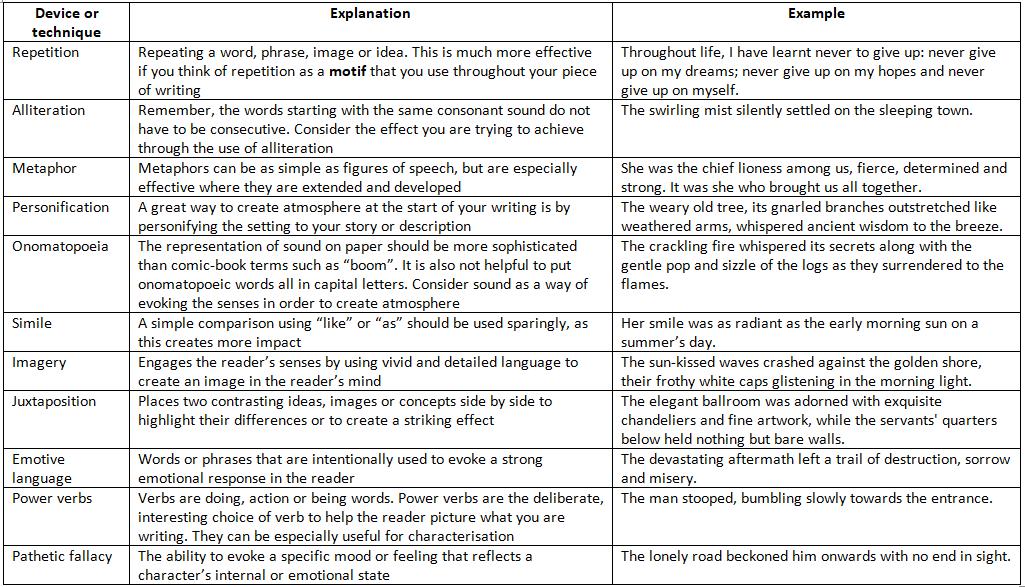
Steps to Success
- Thoroughly review both task options:
- Identify the one where you have a strong concept or idea.
- Dedicate five minutes to planning your writing:
- Utilize a mind-map or Freytag’s Pyramid to outline your story.
- Define your characters, their traits, and their significance to the narrative.
- Determine the narrative perspective: first or third person.
- Note down reminders of figurative language or literary techniques:
- Ensure they enhance interest and detail in your writing.
- Proceed to write your story, adhering to your plan.
- Allocate five minutes for a careful re-reading of your writing:
- Rectify any apparent errors you may have made.
|
17 videos|45 docs
|
FAQs on Narrative Writing: How to Score Full Marks - English Language for GCSE/IGCSE - Class 10
| 1. How can proper planning improve your narrative writing? |  |
| 2. What is Freytag's Pyramid and how can it be used in narrative writing? |  |
| 3. Why is it important to use effective writing techniques in narrative writing? |  |
| 4. How can narrative writing techniques enhance the quality of your writing? |  |
| 5. What steps can you take to ensure success in narrative writing? |  |



















